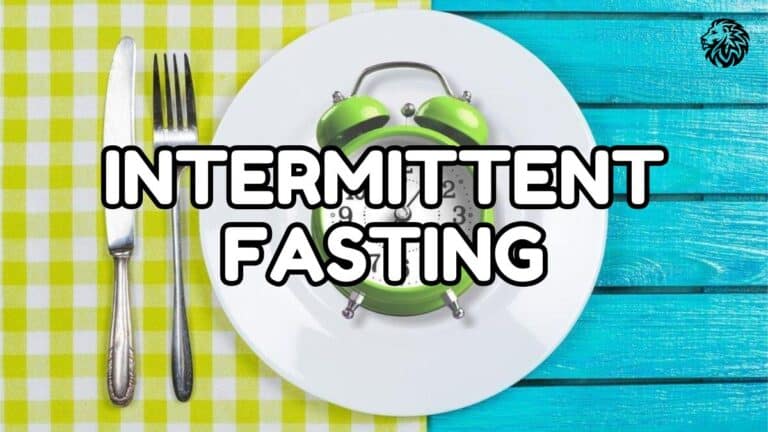Recent years have seen a rise in the acceptance of intermittent fasting as a quick and efficient weight loss strategy. This nutritionally sound eating strategy offers a number of health advantages in addition to helping people lose weight. We will delve into the world of intermittent fasting in this complete guide, learning what it comprises, its many benefits, and how to successfully incorporate it into your daily life. In addition, we’ll respond to five frequently asked questions so you can decide for yourself whether intermittent fasting is the best weight reduction plan for you.
Key Takeaways
- Intermittent fasting is an effective weight loss strategy that involves alternating periods of eating and fasting, with various methods available, such as the 16/8, 5:2, Eat-Stop-Eat, and Alternate-Day Fasting approaches.
- Benefits of intermittent fasting for weight loss include caloric restriction, improved insulin sensitivity, enhanced fat burning, and hormonal balance.
- Tips for success with intermittent fasting include staying hydrated, prioritizing nutrient-dense foods, gradually easing into fasting, listening to your body, and combining fasting with regular exercise.
- Intermittent fasting may not be suitable for everyone; pregnant or breastfeeding women, individuals with a history of eating disorders, and those with certain medical conditions should consult with a healthcare professional before starting an intermittent fasting regimen.
What is Intermittent Fasting?
Intermittent fasting is an eating pattern that involves alternating periods of eating and fasting. Instead of dictating what types of food you can consume, it focuses on when you eat. This method has been practiced for centuries across various cultures and religions for health and spiritual reasons. Recent scientific research has demonstrated its effectiveness for weight loss and overall health improvement.
Types of Intermittent Fasting
Intermittent fasting is a dietary approach that involves cycling between periods of eating and fasting. There are several types of intermittent fasting, each with their own unique schedule and guidelines. Know lets dive into the the most popular types of intermittent fasting and learn how they are differ from each other.
- 16/8 method: This is also known as the “Leangains” method and involves restricting food intake to an 8-hour window each day, followed by a 16-hour fast. During the 8-hour window, individuals can eat 2-3 meals. This method is the most popular form of intermittent fasting and can be easily incorporated into most people’s lifestyles.
- 5:2 diet: This approach involves eating normally for 5 days of the week and restricting calorie intake to 500-600 calories on 2 non-consecutive days. On the remaining days, individuals can eat normally. This method can be more challenging for some people, but it allows for more flexibility in terms of what can be eaten.
- Eat-stop-eat: This method involves fasting for 24 hours once or twice a week. This means that no food or drinks with calories are consumed during the fasting period. This method can be difficult for some people, but it can be effective for weight loss and improving insulin sensitivity.
- Alternate day fasting: This approach involves alternating between a 24-hour fast and a normal eating day. For example, individuals may eat normally on Monday, fast on Tuesday, eat normally on Wednesday, and so on. This method can be challenging for some people, but it can be effective for weight loss and improving metabolic health.
- Warrior diet: This method involves eating one large meal at night and fasting during the day. Individuals are allowed to consume small amounts of fruits and vegetables during the day if they feel hungry. This method can be difficult to adhere to, but it can be effective for weight loss and improving insulin sensitivity.
There are several types of intermittent fasting, each with their own unique schedule and guidelines. The trick is to find a method that works best for you and stick with it! Discipline and consistently over time is vital for your success.
Benefits of Intermittent Fasting for Weight Loss
Intermittent fasting is a dietary approach that involves cycling between periods of eating and fasting. It has become increasingly popular as an effective diet plan for weight loss. We will now learn about some of the benefits of intermittent fasting has for weight loss.
- Calorie Restriction: Intermittent fasting can help with weight loss by reducing calorie intake. By restricting the amount of time you eat, you naturally consume fewer calories overall. This can create a calorie deficit, which is necessary for weight loss.
- Increased Metabolic Rate: Intermittent fasting has been shown to increase metabolic rate, which can help with weight loss. During periods of fasting, the body switches to burning stored fat for energy, which can lead to weight loss.
- Improved Insulin Sensitivity: Intermittent fasting has been shown to improve insulin sensitivity. This can be effective in helping with weight loss. When insulin sensitivity is improved, the body is better able to use insulin to regulate blood sugar levels. This can lead to decreased hunger and reduced calorie intake.
- Reduced Inflammation: Intermittent fasting has been shown to reduce inflammation in the body. Chronic inflammation can contribute to weight gain and make it difficult to lose weight. By reducing inflammation, intermittent fasting can help with weight loss.
- Increased Fat Burning: Intermittent fasting can increase the body’s natural ability to burn fat for energy. This can lead to greater weight loss over time.
- Improved Gut Health: Intermittent fasting can improve gut health by promoting the growth of healthy gut bacteria. A healthy gut microbiome has been linked to improved weight loss and overall health.
Weight loss techniques like intermittent fasting can be very effective. By lowering calorie intake, raising metabolic rate, enhancing insulin sensitivity, lowering inflammation, raising fat burning, and enhancing gut health, it can aid in weight loss. Intermittent fasting should be utilized along with a good diet and exercise program. It is very important to understand that intermittent fasting is not a miracle cure for weight loss.
Tips for Success with Intermittent Fasting
To ensure a successful intermittent fasting journey, follow these helpful tips:
- Stay Hydrated: Drinking plenty of water throughout the day is essential, especially during fasting periods.
- Prioritize Nutrient-Dense Foods: During eating windows, focus on consuming whole, unprocessed foods, such as fruits, vegetables, lean proteins, and healthy fats.
- Gradually Ease into Fasting: Start with shorter fasting periods and gradually extend them as your body adjusts. This will help minimize potential side effects and improve adherence.
- Listen to Your Body: Pay attention to how your body responds to fasting and adjust your approach as needed. If you experience dizziness, extreme hunger, or other adverse effects, consider modifying your fasting method or schedule.
- Combine with Regular Exercise: Incorporating physical activity into your routine can enhance weight loss and provide additional health benefits.
What You Need to Know Before Starting Intermittent Fasting for Weight Loss
When it comes to Intermittent Fasting, you’ll want to discover a method that best aligns with your lifestyle and routines. Perhaps the 16/8 approach may be a better choice for you if you’re pressed for time and struggle to adhere to a restrictive eating window. However, if you’re seeking a more drastic approach to weight loss, alternate-day fasting could be the better alternative.
Bear in mind, Intermittent Fasting is not a quick-fix solution for weight loss. While it can be an effective tool, it’s important to combine this dietary approach with healthy eating habits and a regular exercise routine for optimal results. Therefore, focus on consuming nutrient-dense, whole foods while steering clear of processed foods, sugar, and unhealthy fats.
Additionally, it’s critical to be mindful of your caloric intake during your eating window. Even though you may be fasting for a set number of hours, it does not imply that you can consume unlimited amounts of food. Overeating can undo all the benefits of Intermittent Fasting and lead to weight gain. Remember, moderation is key!
Frequently Asked Questions
Can I drink liquids during the fasting period?
Yes, you can consume non-caloric beverages such as water, black coffee, and unsweetened tea during fasting periods. These drinks help maintain hydration and curb hunger without breaking the fast.
Will intermittent fasting cause muscle loss?
Intermittent fasting, when done correctly, is unlikely to cause significant muscle loss. Adequate protein intake and regular resistance training can help preserve muscle mass while losing weight.
Is intermittent fasting suitable for everyone?
While intermittent fasting can be beneficial for many people, it may not be suitable for everyone. Pregnant or breastfeeding women, individuals with a history of eating disorders, and those with certain medical conditions should consult with a healthcare professional before starting an intermittent fasting regimen.
How quickly can I expect to see weight loss results?
Weight loss results can vary depending on factors such as individual metabolism, starting weight, and adherence to the fasting schedule. Some individuals may see results within the first few weeks, while others may take longer.
Can I continue intermittent fasting indefinitely?
Intermittent fasting can be maintained long-term as a lifestyle choice, provided it is practiced safely and sensibly. It is essential to listen to your body, prioritize proper nutrition, and make adjustments as needed. Some people may choose to cycle between periods of intermittent fasting and regular eating patterns to maintain their desired weight and health goals.
References:
- Patterson, R. E., & Sears, D. D. (2017). Metabolic Effects of Intermittent Fasting. Annual Review of Nutrition, 37, 371-393.
- Mattson, M. P., & Longo, V. D. (2014). Fasting: Molecular Mechanisms and Clinical Applications. Cell Metabolism, 19(2), 181-192.
- Varady, K. A. (2011). Intermittent versus daily calorie restriction: Which diet regimen is more effective for weight loss? Obesity Reviews, 12(7), e593-e601.







